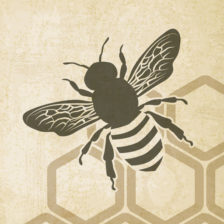The concept is simple. Most antibiotics used in both human and animal medicine are broad spectrum, doing away with many good as well as bad actors. Overuse of these materials results in resistance building up, making some antibiotics no longer usable. At the same time, many good or beneficial organisms are killed off with often […]
Beekeeping Smart Phone Applications
Many beekeepers have a tough time recording all that goes on in an apiary and in their beehives. A lack of Record keeping often is the cause of fuzzy thinking about management and works against the beekeeper. A number of beekeeping applications are now available for smartphones. specifically designed to help beekeepers keep track of this […]
Apis Information Resource News, 3/29/18
Dear Subscribers: I have just returned from the University of Florida’s Bee College. The staff under direction of Dr. Jamie Ellis crammed a lot of information about keeping honey bees into a short time period. We found out that this was in fact the 25th edition of this event, which now rotates between middle […]
The Latest on Colony Collapse Disorder
The latest information linked above reveals that the four P’s must now be considered the real villains responsible for Colony Collapse Disorder or CCD: — poor nutrition, pesticides, pathogens and parasites. The saga thus continues concerning Colony Collapse Disorder (CCD). The condition spawned many academic papers. Historically speaking CCD certainly looks related to unexplained honey […]
First Queen Rearing Station in the Middle East
The above is a revealing post. The station claims to be rearing “Saskatraz” queens, something many, including this author, are not familiar with. Other thoughts on the complexity and possible advantages of queen breeding can be found here. This information lends credence to the maxim that all honey bees are not alike. A recent discussion […]
Beekeeping and Human Activity – Apicentric Beekeeping
Robert Owen in a research essay published by the Journal of Economic Entomology linked above suggests that human activity is a key driver in the spread of pathogens affecting the European honey bee (Apis mellifera). These include: Regular, large-scale and loosely-regulated movement of bee colonies for commercial pollination. (For instance, in February 2016 alone, of […]
Apis Information Resource News, 1/30/2018
Dear Subscribers, A belated Happy New Year from Gainesville, Florida, home of the Apis Information Resource Information Center. It’s been colder than normal the last couple of weeks. No way to check our forlorn nuc that we’ve been nursing through the winter. I thought there was a warming trend in the offing, but that is […]
Organic Honey Issues – Glyphosphate and Other Contaminants
Contamination of honey by pesticides is making the news. A recent report reveals that researchers who tested honey from nearly 200 sites worldwide found that 75% of their samples contained some level of the pesticides, according to a report published on 5 October in Nature “The study is the first attempt to quantify the presence […]
Pesticides and Sugar: Lethal Combination
The post above provides various clues to pesticide losses, including the honey bee diet (influence of sugar as an attractant). One concept is that drug interactions might be a key and something called Cytochrome P450 is limiting. This occurs not only in honey bees, but other organisms including humans. This is bad news all around. […]
National Honey Show Lecture Videos
The National Honey Show is the UK’s premier honey show with international classes, lectures and workshops according to the above post. Featured here is a listing of the prestigious lectures given at the show dated from 2013 to the present. Warning: this remarkable list of presentations can consume a lot of your time.
